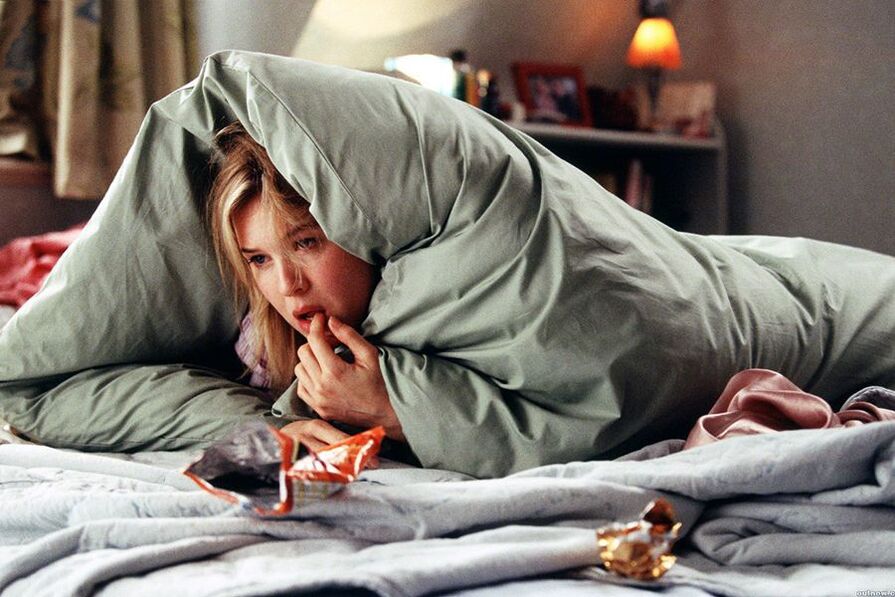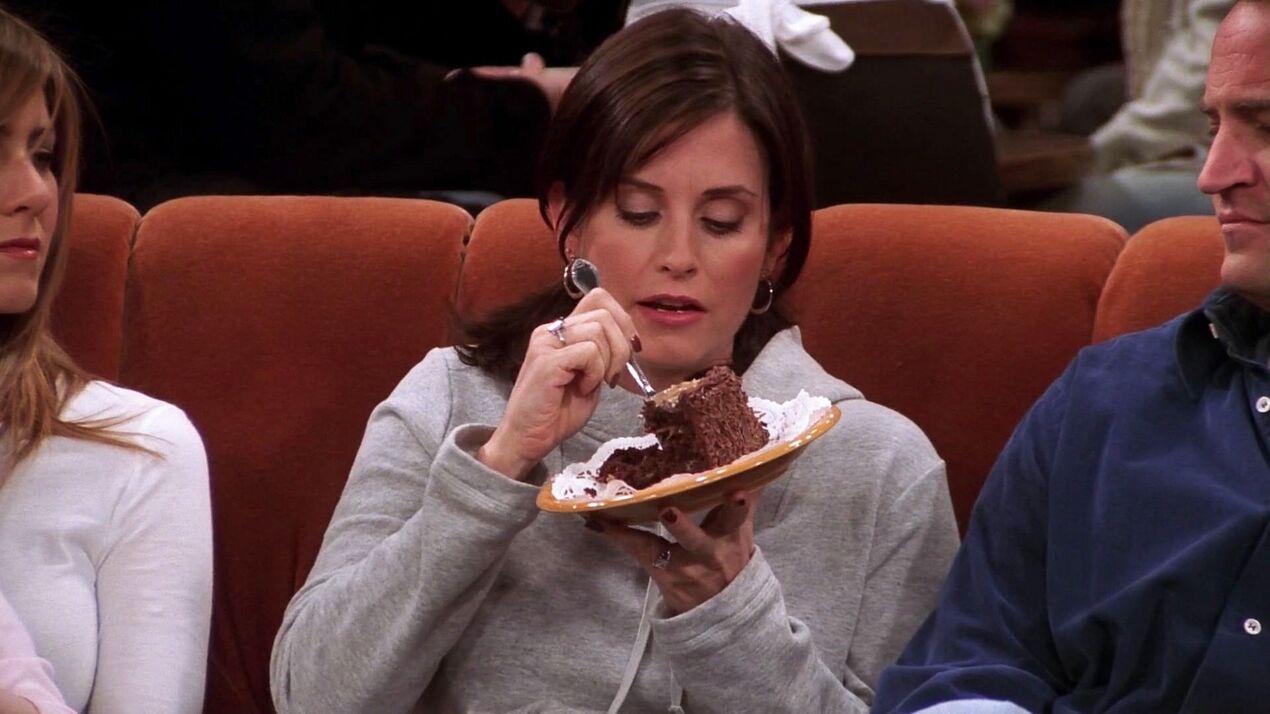
The title contains a popular search engine query. But this article will not offer advice like "count to 10 and drink a glass of water. " Let’s talk about something else: why it is a bad idea to pressure yourself not to eat for weight loss and how to deal with your attitudeon food.
What's wrong with not eating for weight loss?
Practicing psychologist: If you have a healthy attitude towards nutrition, then you are in touch with your body - you hear its signals and you know how to negotiate with it. If the body signals hunger, you satisfy it; satiety, you stop eating. The message "do not eat to lose weight" implies breaking this contact, the confrontation with oneself and the manifestation of self - aggression. It turns out that in order to achieve the goal (weight loss), you have to take measures against yourself. This is not goodOdull and unhealthyOinto.
psychiatrist: Most people who have lost weight as a result of a restrictive diet regain it within 1-2 years. In addition, 2/3 of them get more than they lost.
Endocrinologist:The message of forcing yourself not to eat to lose weight is irrational. It is important to understand: what happens to the body? This may not be a matter of improper diet, but hormonal characteristics.
And what does it mean - a healthy attitude to food?
psychiatrist: This is when regular meals and snacks are not accompanied by anxiety, shame and guilt. Lack of "forbidden foods", dieting and calorie counting. And when you allow yourself to enjoy food.
Endocrinologist:It's about treating food as a condition for a happy life. And not as a substitute for joy and pleasure.
Practicing psychologist: This is when you eat out of hunger, stop when you are full, do not focus on the deficiencies of your body, which must be "corrected" with food or refuse it, when you do not overeat, do not seize emotions.
Can you give him more details? How and why do we eat emotions?
Practicing psychologist: There are no good and bad feelings for the psyche, it can cope with any. She does not require food, alcohol, gadgets or television for this purpose. But there are cases when a person is overwhelmed with food. Upset, I ate a bowl of ice cream - it got easier. His behavior was positively reinforced, and the person began to resort to this strategy over and over again.
Consultant Psychologist:Often, people eat too much due to lack of rest. Let me give you an example. A young woman came up with a problem: in the evening she eats a lot and can not stop herself. It turned out that she works for three, because she does not know how to reject her peers. There is no time to get caught up: business all the time. And in the evening she cannot eat. That is, a person consumes himself, overworkes himself, becomes stressed all the time. How to replenish lost energy? Burger, potato, chocolate.
It happens that if a person eats bored, anxious, angry, tired or sad, is that wrong?
Consultant Psychologist:In and of itself, this is neither good nor bad: food is unconsciously linked to safety. For a newborn, food is not just food, but close to mom, calm, confident, accepting, loving, communicating. Adults sometimes eat to reassure themselves. It's bad when it's the only way to deal with anxiety or fear.
psychiatrist: With food we satisfy various psychological needs. For example, having dinner has a close relationship with your family. Going out to a restaurant with friends closes the need for social interaction. The problem arises when food comes to the fore for our negative experiences. This brings us to the subject of eating disorder (EID) or eating disorder. Psychiatry deals with these problems.
Fan, fan! It turns out, if I ate a chocolate bar after an hour and felt guilty - is this already a disorder? Should I go straight to the psychiatrist?

Practicing psychologist:A complex issue. There are cases when a person eats on the run, chaotically, does not pay attention to what he eats. Or he eats when he's not hungry - out of boredom or out of company. It may be an eating disorder but can be corrected with nutrition. But, at the same time, eating out of hunger is one of the symptoms of RIP. The line is very thin. And only a doctor can determine. In our country, this is accompanied by a psychiatrist.
Endocrinologist:It happens that one is always sad, worried, tired - and seizes these problems. This may be the result of constant stress. But they are also symptoms of ingenous depression and anxiety neurosis. A psychiatrist is also involved in diagnosing such conditions.
But isn't it ERP - Bulimia and Anorexia? The symptoms are hard to confuse
psychiatrist: It's not just bulimia and anorexia. Eating disorders include psychogenic overeating (also known as paroxysmal or compulsive), eating inedible food (pick disease), and psychogenic loss of appetite. These are disorders that are included in the International Classification of Diseases (ICD). However, there are disorders that are not only included in this list, but also attract the attention of psychiatry: selective eating disorder, orthorexia (when the desire for a healthy lifestyle transcends all limits) and pregorexia (the dietmost severe restrictive in pregnant women). .
Practicing psychologist: Psychology also distinguishes Eating Syndrome (BOE): when a person eats almost nothing all day, cannot sleep for a long time, or often wakes up and, on waking, goes tothe refrigerator.
Is obesity also ERP?
psychiatrist: Not always. There can be many causes - these are genetics, and sedentary lifestyle, and hormonal disturbances. RPP cannot be equated with obesity.
Practicing psychologist: Yes, I agree. Obese people with completely healthy behaviors. And it happens the other way around - for example, patients with anorexia nervosa.
Have you heard that the problem of RPP is primarily about women, teenagers and models? Is it true?

psychiatrist:Of course not. The disorder can develop at any age in both men and women. For example, selective eating disorders often occur in children - the child only eats certain foods.
Practicing psychologist: Anorexia and bulimia are more common in women. But compulsive overeating - equally in men and women. So RPP cannot be said to be a single female problem. And yes, teenagers, models, athletes involved in aesthetic sports (rhythmic gymnastics, figure skating, sports dancing), TV presenters, bloggers, actresses - everyone who is in sight and whose work depends on seemingly endangered. But the problem can overtake anyone, including those far from the business of modeling or beauty blogging.
It is believed to be an attempt to highlight any nutritional problems. Is this true?
Practicing psychologist: There is such an opinion, but it has no scientific basis. Yes, during therapy, RPP may have started when the person was not accepted by peers. For example, for a 13-15 year old girl, it is important that the boys look at her and her friends approve, so she went on a strict diet. Problems with food also occur as a child's attempt to attract the attention of parents, often unconsciously. But these are rather special cases. It is wrong to think that the need for attention is the main cause of eating disorders.
So what's the reason?
Practicing psychologist: There are three groups of reasons: biological, psychological and social. Biological - for example, genetic predisposition for RPC - unfortunately, it can be inherited. Psychology - domestic violence, prohibition of expressing negative emotions, violation of parent-child attachment (for example, if the child has a cold, aloof parents). Social - a cult of ideals of beauty, thinness, bullying.
psychiatristA: There are certain personality traits that may contribute to the development of EID, such as perfection or hyperresponsibility. Characteristics of family eating behavior, attitude towards weight and figure also influence. The baby could be rewarded with sweets for good behavior and study, and this is stuck: since I am good, you can take candy. Very good? I will take ten.
Consultant Psychologist:Many patients with ECD experienced physical or sexual abuse. For many, too, food helps to reap secondary benefits. For example, one of my clients needed weight to protect herself from men. During therapy, we discovered that the girl of school age was in an unpleasant position with an adult male. The client was surprised that she remembered this: this story seemed "forgotten", but it continued to influence the girl’s behavior in adulthood. They also expressed the belief that men love only slim heads. If so, the extra weight helped her "be safe", that is, without men.
How common are eating disorders in society?

psychiatrist: The worldwide prevalence of RPCs is believed to be around 9%. In risk groups, the prevalence is higher. There are studies of young girls who report that about 13% under the age of 20 have CRP symptoms. Anorexia is one of the fatal mental disorders, preceded only by chemical addiction.
Practicing psychologist: It is difficult to give exact numbers, as people with PAD often do not realize that they need help. There are numbers for the United States, because it is a center for eating disorders research and statistics: about 30 million people are living with eating disorders. There are twice as many women as men (20 million to 10 million). And every hour in the world at least 1 person dies from the effects of RPE.
What are the properties of RPE? Can I diagnose it myself?
psychiatrist: In general, the main properties are:
- Vomiting after eating or compensating for what he has eaten in other ways, for example, excessive physical activity (physical tyranny), laxatives and stimulants.
- Strong weight and figure setting (you can't add / lose one gram or centimeter! ).
- numerous efforts to reduce weight and swing body weight.
- Numerous different rules in nutrition (I eat only proteins, only vegetables, but red).
- Constant thoughts, fears and feelings of guilt and shame associated with food intake and body weight. When a lot of suffering comes from food-related thoughts and behaviors.
- Loss of control over consumption.
But many of them may have symptoms of varying degrees. Is there a more accurate diagnosis?
Endocrinologist:RPD is a chronic systemic disease. It causes metabolic changes in systems and organs, changes in human neurohumoral regulation. This is a complex problem that can manifest in neurosis, organic pathologies of the brain, organic lesions and depressive disorders.
But first you need to determine the cause of the symptoms. For example, if a person runs to the refrigerator at night, you need to know the glycogen level to exclude insulin resistance and type 2 diabetes mellitus.
What if you realize that you or your relatives have RPP?
Practicing psychologist: If yes - consult a psychiatrist for a diagnosis. If you doubt RPP in relatives, it's harder: he often refuses, does not want to admit that something is wrong with him. And unnecessary pressure can break confidence. Let your relatives know that you are on their side, ready to help and support.
Who Treats ECD? One psychiatrist?
psychiatrist: No. A psychiatrist makes a diagnosis. And it heals, depending on the disease, a psychiatrist, psychotherapist, clinical psychologist (as prescribed by a psychotherapist). Why is it so important to see a psychiatrist in the first place? Because it can reveal comorbid conditions such as depression or anxiety disorder, which are found in about 80% of cases in people with RPD. Treatment depends on the severity of the disease. It can be a drug therapy in combination with psychotherapy (group, cognitive, dialectical behavior). Family therapy is also recommended.
Consultant Psychologist:Anorexia and bulimia are primarily treated by a psychiatrist. Emotional overeating - psychologist, consultant psychologist. Obesity - a nutritionist-endocrinologist (you need to check hormones, whether the metabolism is disturbed) together with a psychologist or psychotherapists.














































































